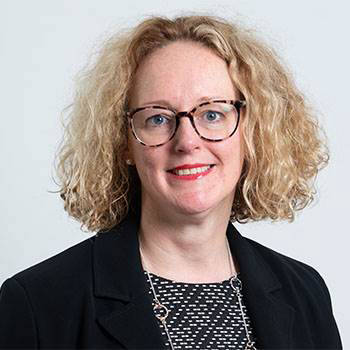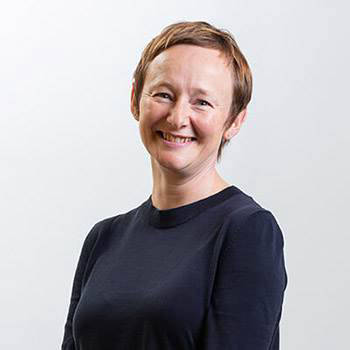- Home
- Media centre
- Press room
- Female trio driving diversity and inclusivity at Anchor Hanover
08 March 2021
Female trio driving diversity and inclusivity at Anchor Hanover
As we celebrate International Women’s Day 2021, we use the opportunity to look closer to home to England’s largest not-for-profit provider of specialist housing and care for people in later life, Anchor Hanover, which is under the leadership of female Chief Executive, Jane Ashcroft. 
The pandemic has shone a light on the value of roles within the care sector which are more often than not held by women. Anchor Hanover has an 83% female workforce.
Jane said:
A focus for us during the pandemic has been about providing wrap around support for our workforce in the face of the increased pressures that often fall on the shoulders of women. We have introduced a series of initiatives as part of our wellbeing strategy that support women of all ages in the workplace, such as providing support and raising awareness of the impact menopause may have at work through to fertility struggles.
With a passion for people, learning and understanding behaviours, Jane started her career at Midlands Electricity in corporate governance then soon found a route into HR where she held several senior HR roles across the housing and care sector. Jane describes the fact that she is interested in people as her superpower, it is what she feels she is particularly proud of. Jane said:
An HR pathway to Chief Executive is unusual, not just in the housing and care sectors but for CEOs more broadly. I am fully focused on getting the best out of people by understanding how they tick. Over time I have found this approach generates the greatest outcomes. When I am visiting residents, they talk about people not about the amenities. Our colleagues are our greatest asset and make the biggest difference.
Jane’s passion for supporting colleagues is clear – as is the fact that she is keen to create a culture that motivates and encourages independence. Jane, her Chief Financial Officer Sarah Jones and Executive Director of Business Services, Kate Smith all acknowledge that as leaders of a 10,000+ strong workforce, it’s important to be adaptable and be comfortable with ambiguity.
Jane comments:
When you move into leadership roles, you can no longer say you wouldn’t ask anyone to do a job that you haven’t done, because as a Chief Executive there are many jobs within Anchor Hanover that I haven’t done. Instead, it is important to listen to, trust in, and learn from, the people that surround you.
Kate Smith added:
There is no way I can know the ins and outs of everything I am responsible for. As a detail junkie it’s challenging to accept that’s the case! however instilling a supportive culture ensures my teams are motivated to make decisions. They make my job easier and I am comfortable as their greatest advocate.”
Sarah Jones, Chief Financial Officer at Anchor Hanover surprisingly didn’t grow up wanting to be an accountant as she had always imagined a career in the arts. However, an unexpected life event stopped short her English Literature degree and instead she embarked on a career in retail and was soon headhunted for the financial department. She said:
I class myself as a control freak, I love the detail and the secret engineer in me likes to know how things work. This is why I think I was drawn to finance. The holistic overview it provides supports my need for detail.
All three women during their careers have faced barriers because of their gender but have each found ways to overcome these and use some of the challenges faced to their advantage. Jane said:
I had never been a CEO before I became a CEO, if you told the 8 or 18-year-old me that I would be a CEO she would be very proud. Speaking with friends and colleagues in recruitment, a trend they often reflect on is confidence in women on taking the next big step up the career ladder. This is a trend not seen in men who are much more confident in their ability and prepared to bridge the gap.
Sarah agreed that as a woman a common trait is self-deprecation, she said:
We often don’t shout enough about our achievements. This was something I learnt to switch up early on in my career after witnessing that was not how my male colleagues operated. I stopped using ‘we’ and instead used ‘I’, attributing credit to team members where due but certainly having much more confidence in my role and ability.
Executive Director of Business Services, Kate Smith also experienced barriers aligned to confidence but attributes her success to her baked-in resilience and determination. She said:
aligned to confidence but attributes her success to her baked-in resilience and determination. She said:
My father died when I was very young. I had a very strong role model in my mum who brought me up in equity with my brother, whilst also impressing on me that I may need to work that little bit harder to be acknowledged but it will be worth it. She was right. I focused on doing a great job and earning my stripes to be taken seriously by the ‘men’, once I had done that my position was secured and respected and my confidence grew.
Resilience, adaptability, and emotional intelligence are three attributes Jane, Sarah and Kate cite as qualities that they believe supported them in their route to senior leadership roles. Whilst all three women experienced similar gender specific barriers in the earlier stages of their careers, they are all positive about the outlook for women in 2021 and beyond.
Jane added:
There are many more women in senior roles now. It is very unusual for me to be the only woman in a room or on a screen, however we still have a long way to go. When I look back to the early stages of my career, especially in my early days as a CEO in the housing sector, I was often the only woman in the room. I quickly learnt to speak up and know my value. At the age of 28, I was approached to apply for Director of Corporate Services role. I doubted myself; it was only on the advice of my male boss who said, ‘If you’re good enough, you’re old enough’ did I apply and secure the position, without his gentle nudge I most likely wouldn’t have had the confidence to apply.
Both Sarah and Kate also started their careers in traditionally male run industries, Sarah in retail and Kate in industrial pollution prevention. Both, disappointingly, have numerous stories of casual everyday sexism to recite over their careers.
However, while both women say times have changed, they believe there remains a need for a clear focus on diversity and inclusion agendas . Sarah said:
. Sarah said:
On a macro level, changes in the political and social environment and the responses to them, Black Lives Matter being the best example, have served to change my perspective - battles that I thought we had fought and won when I was younger are being fought again. As a consequence, I believe that, while I will continue to mentor resilience, I have a greater role to play in calling out poor behaviours and practice whenever I can so that women don’t have to continue to have the skills to ‘cope’ because they just shouldn’t have to.
Jane added:
We have a reverse mentoring scheme, a leadership programme for Black, Asian and Minority Ethnic (BAME) colleagues where participants partner with senior managers to foster deeper understanding of experiences and challenges faced by people from BAME communities. I have been fortunate in being mentored by some truly inspirational colleagues. My first mentoring session was with a colleague from embRACE, our race and ethnicity colleague network. She really helped broaden and deepen my thinking and in our first conversation encouraged me to read the book ‘Why I am no longer talking to white people about race’ by Reni Eddo-Lodge, which I did and have encouraged many others to since. I now currently have a mentor from our disability network. It is important to me to always learn about colleagues and our residents. However, I am also very conscious of the fact that as a woman, I do not claim to understand every woman, instead we are focused on bringing diversity and individual experiences and skills through the organisation to deliver the best results.
Sarah adds:
Having a diverse workforce should be the norm, not just because it is the right thing to do, but because it is the best thing to do from a bottom-line perspective. A diverse board room, full of excellent minds having enjoyed different lived experiences delivers greater results. Differences should be the things that qualify you for a role, not discriminate.
When Jane started her career the narrative around diversity was focused on equal opportunities, she is thankful that the debate has evolved. She said:
I remember people talking about being ‘colour blind’ or ‘gender blind’ and there was a focus on treating people the same. Now, thankfully we are progressive and focused on valuing people as individuals, this makes us a much richer society. We have a diverse customer base, be that gender, sexuality, ethnicity – it is our role to reflect that and respect the benefits enjoyed by having a diverse workforce.
Sarah is optimistic about the positive changes inspired by the pandemic. She said:
The possibilities are positive; traditionally our transactional roles have been office based with rigid hours, the pandemic has highlighted that this doesn’t have to be the case meaning we are able to access a greater pool of talent by offering greater flexibility to colleagues which excites me. I am also buoyed by the number of male colleagues that are now more present in the home and enjoying the benefits of flexible working and more time with the family. Family has previously, sadly, been seen as a sign of weakness. The pandemic has flipped this, and it is now seen as a positive, a real acknowledgement that people have a life outside of work. Respecting and understanding this allows for greater transparency and an embedded culture of caring for our colleagues.
However, Sarah adds that many roles that have been hardest hit were mainly occupied by women such as hospitality, arts and retail.
Kate added:
My fear is that the pandemic may have put back women’s liberation decades due to economic hardship being faced in the hospitality and retail industry. I am hopeful however that there will be greater recognition of the value brought to society by official caring roles, held predominantly by women, the wave of affection, appreciation and empathy will hopefully bring about more permanent change and respect for the care profession.
Jane concluded:
There is a need to look ahead and take the positives from the pandemic. A legacy that I hope to see is greater recognition of the role of care workers. We want to see a much more diverse workforce of women and men embarking on careers in the sector because of the value and job satisfaction enjoyed.
This website uses cookies which track activity so that you get the best possible experience. By continuing to use this website we will assume you are happy and cookies will be set. You can change your cookie settings at any time.

